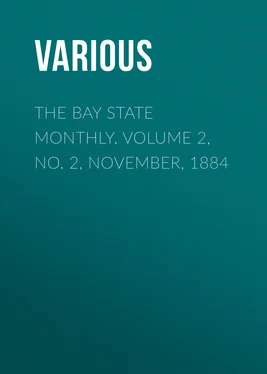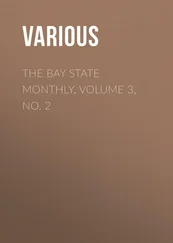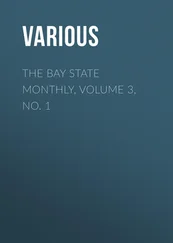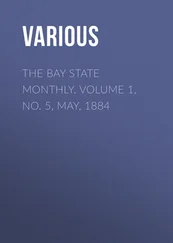Various - The Bay State Monthly. Volume 2, No. 2, November, 1884
Здесь есть возможность читать онлайн «Various - The Bay State Monthly. Volume 2, No. 2, November, 1884» — ознакомительный отрывок электронной книги совершенно бесплатно, а после прочтения отрывка купить полную версию. В некоторых случаях можно слушать аудио, скачать через торрент в формате fb2 и присутствует краткое содержание. Жанр: foreign_antique, periodic, foreign_edu, на английском языке. Описание произведения, (предисловие) а так же отзывы посетителей доступны на портале библиотеки ЛибКат.
- Название:The Bay State Monthly. Volume 2, No. 2, November, 1884
- Автор:
- Жанр:
- Год:неизвестен
- ISBN:нет данных
- Рейтинг книги:5 / 5. Голосов: 1
-
Избранное:Добавить в избранное
- Отзывы:
-
Ваша оценка:
- 100
- 1
- 2
- 3
- 4
- 5
The Bay State Monthly. Volume 2, No. 2, November, 1884: краткое содержание, описание и аннотация
Предлагаем к чтению аннотацию, описание, краткое содержание или предисловие (зависит от того, что написал сам автор книги «The Bay State Monthly. Volume 2, No. 2, November, 1884»). Если вы не нашли необходимую информацию о книге — напишите в комментариях, мы постараемся отыскать её.
The Bay State Monthly. Volume 2, No. 2, November, 1884 — читать онлайн ознакомительный отрывок
Ниже представлен текст книги, разбитый по страницам. Система сохранения места последней прочитанной страницы, позволяет с удобством читать онлайн бесплатно книгу «The Bay State Monthly. Volume 2, No. 2, November, 1884», без необходимости каждый раз заново искать на чём Вы остановились. Поставьте закладку, и сможете в любой момент перейти на страницу, на которой закончили чтение.
Интервал:
Закладка:
Various
The Bay State Monthly – Volume 2, No. 2, November, 1884
GROVER CLEVELAND
Save only that of Ulysses S. Grant, no name in America has come from comparative obscurity into national eminence in so short a time as that of GROVER CLEVELAND.
The fame of Grant was wrought out through the exigencies of a great civil war, in which the unity of the Republic was the issue involved. The distinction which Cleveland has achieved comes of valiant service in another field of conflict, wherein the issue involves the perpetuity and dominance of the great principles which constitute the framework and fibre of republican government itself. Under ordinary circumstances, probably, neither Grant nor Cleveland would have risen above the plane of every-day life. The same, too, might perhaps justly be said even of Washington. In the history of human progress it will be seen that every great crisis involving the triumph of the principles and tendencies which make for the moral, social, or political advancement of mankind has developed a leader endowed with the special qualities demanded by the occasion.
The brilliant and self-assertive men who press forward to leadership in ordinary times, whether impelled by mere love of notoriety, personal ambition, or an honest desire to promote the welfare of their fellow-men, seldom become masters of the situation when a supreme emergency arises. They may set in motion great contending forces; they may precipitate conflicts whose ultimate outcome brings inestimable benefit to mankind; but other hands and other minds are required to direct the issue and shape the result. The master spirit of the occasion is born thereof. Ulysses S. Grant had absolutely no part in bringing about that great conflict of ideas and systems which culminated in the war of the rebellion; nor had he even figured prominently in the field of military achievement until long after hostilities were commenced, and the struggle had assumed proportions entirely unforeseen by, and actually appalling to, not only the people themselves, but those In control of active operations in the field. But the emergency developed the man required to meet it, and Grant came to the front.
So, too, in this later and greater conflict, which is to test the virtue and determine the durability of popular government—whose outcome is to decide whether political parties are to be the mere instruments through which the people express their will, and whose relations can be changed as the public good may seem to require, or whether the government itself shall be subordinated to party, and its functions prostituted for the perpetuation of party ascendency and the aggrandizement of corrupt and selfish individuals—the leader in whom the hopes of those who contend for the supremacy of the popular will, the surbordination of party-power to public welfare, and the administration of the government in the interests of the whole people, are now thoroughly centred, is one who has gained no distinction in shaping partisan contests, and won no laurels in the halls of legislation or the forum of public debate. He is, simply, the man who, in the last few years, first in one, and then in another still more important position of official responsibility, has demonstrated more emphatically than any other in recent times (possibly because circumstances have more generally drawn attention in his direction) his thorough devotion to the doctrine that public office is a public trust; and has, therefore, been selected as the best representative and exponent of the popular idea in the great political conflict about to be brought to an issue.
The purpose and scope of this brief article permit no detailed account of the private life or public career of Grover Cleveland. Those who have cared to do so have already familiarized themselves with the same through the ordinary channels; yet, as a matter of record, a few salient facts may be presented.
Grover Cleveland was born in the village of Caldwell, near Newark, New Jersey, March 18, 1837. His paternal ancestry was of the substantial English stock.
I. Aaron Cleveland, an early settler in the valley of the Connecticut. He was liberally educated, and, ardently devoted to the interests of the Church, he determined to take holy orders, and returned to England for confirmation therein. Coming back to America he settled in the ministry at East Haddam, Conn. Some fifteen years later, in August, 1757, he died, while on a visit to Philadelphia, at the residence of his friend, Benjamin Franklin, then publisher of the Pennsylvania Gazette , who spoke of him, in an obituary notice in his paper, as "a gentleman of a humane and pious disposition, indefatigable in his ministry, easy and affable in his conversation, open and sincere in his friendship, and above every species of meanness and dissimulation."
II. Aaron Cleveland, born at East Haddam, Conn., February 9, 1744. He was a hatter by trade and located in Norwich, which town he represented in the Legislature, where he introduced a bill for the abolition of slavery, of which institution he was a determined opponent. Subsequently he became a Congregational clergyman, and a power in that denomination. He died at New Haven in 1815.
III. William Cleveland, second son of the above, a silversmith by occupation, also dwelt in Norwich. His wife was Margaret Falley. He was prosperous in business, respected in the community, and deacon of the church of which his father had been pastor for a quarter of a century previous to his decease.
IV. Richard Falley Cleveland, second son of William, born in 1804, graduated from Yale in 1824 with high honors. He, too, became a clergyman, having adopted the Presbyterian faith, and pursued his studies at Princeton Theological Seminary, after serving a year as a tutor in Baltimore, where he made the acquaintance of Miss Anne Neale, daughter of a prominent law publisher of Irish birth, with whom he united in marriage after completing his studies, in 1829. He was located in pastorates, successively, at Windham, Conn.; Portsmouth, Va.; Caldwell, N.J., and Fayetteville, N.Y. Subsequently, moved by failing health, he sought a change, and, as agent of the American Home Missionary Society, located at Clinton. Two years later he returned to pastoral service, though still In feeble health, establishing himself and family at Holland Patent, a few miles north of the city of Utica. Here he died suddenly, a few weeks after his removal, leaving to his wife and nine children no other fortune than the legacy of an honorable name, and the enduring influence of a true and devoted life.
V. Grover Cleveland, third son and fifth child of Richard Falley and Anne (Neale) Ceveland, was sixteen years of age when his father died. The sad event necessarily marked a turning-point in his career. He was forced to look life and duty seriously in the face, and he proved himself equal to the emergency. It had been a cherished hope of his boyhood that he might secure the benefit of a classical education at Hamilton College, from which his eldest brother, William (now a Presbyterian clergyman at Forestport, N.Y.), had then recently graduated. But this was now out of the question. He had not only to provide for himself, but he felt bound to aid his mother in the support of the younger members of the family. The idea of the college course, for which he had partially fitted himself in the preparatory school at Clinton, was relinquished, and the battle of life commenced in earnest. He had already learned something of the lesson of self-reliance, having served for a year or more as a clerk in a grocery at Fayetteville, and he soon secured a situation as an assistant in the Institution for the Blind in the city of New York, where his brother William was then engaged as a teacher. Here he remained nearly two years, faithfully discharging the duties assigned him, and promptly forwarding to his mother such portion of his moderate wages as remained after providing for his own personal necessities. The situation, however, grew irksome. As the young man's capabilities developed his ambition was aroused. There was no way of advancement open before him here, and he felt that his duty to himself, as well as others, demanded that he make the best practicable use of the powers with which he was endowed. Returning home for a short visit, and taking counsel with his mother, he soon set out for the "West," the field toward which ambitious young men have turned, with hearts full of hope, for the last half century.
Читать дальшеИнтервал:
Закладка:
Похожие книги на «The Bay State Monthly. Volume 2, No. 2, November, 1884»
Представляем Вашему вниманию похожие книги на «The Bay State Monthly. Volume 2, No. 2, November, 1884» списком для выбора. Мы отобрали схожую по названию и смыслу литературу в надежде предоставить читателям больше вариантов отыскать новые, интересные, ещё непрочитанные произведения.
Обсуждение, отзывы о книге «The Bay State Monthly. Volume 2, No. 2, November, 1884» и просто собственные мнения читателей. Оставьте ваши комментарии, напишите, что Вы думаете о произведении, его смысле или главных героях. Укажите что конкретно понравилось, а что нет, и почему Вы так считаете.












